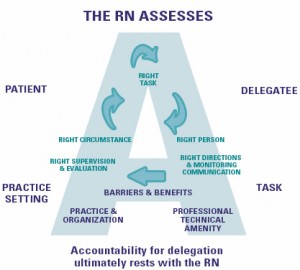Shortly after becoming a manager, most managers realize that one of the advantages in this new situation is that you don’t have to do everything by yourself. Some realize sooner or later that you actually cannot do everything by yourself (others somehow reach the conclusion that you don’t need to do anything by yourself, but that’s a different story). At this point you get to ‘choose’ which kind of a manger you want to be, I guess the scale can be set between micro-management and what I refer to as management by context.

I had a manager once who said that his entire job is to give us context (obviously, in the managing-down direction only. Managers do sideways and upwards management work too, but I’ll concentrate on the down part). This also meant that conflicts and questions in his group shouldn’t reach him, as he, in principle, do not want to give concrete guidance – the solutions should be reached within the group’s scope, relying on and following the provided context. This may sound nice in theory, but practically this meant that it was very hard to reach any decision, mainly because there was no single point in the hierarchy who could and/or would take the responsibility for hard decisions.
It seems to me that this notion of providing context (and effectively nothing more) is the most extreme case of delegation, which got me thinking about the fine line between delegating tasks to achieve more and create synergy, to de-facto delegate core management responsibilities (like, for example, avoiding decision making when decision making is due).
Delegating stuff to your subordinates requires you to trust them in more than one way. You need to believe they are competent, you need to believe they will come to ask for help when they get stuck, but you also need to believe that they will learn and grow from this experience. That last point seems important to me, as delegation is not about the day-to-day tasks of your team, it’s about the day-to-day task you have, which are inherently of the, well, managerial type. So, sharing your tasks with a person reporting to you gives him a chance to prove himself in an area he doesn’t get to experience every day, usually out of his comfort zone and gives you both a chance to increase this assurance that he can take on bigger and bigger roles. However, I tend to think that not every managerial task should be delegated.

I tried to think of a definition for the kind of tasks you should avoid delegating on regular basis (there are cases, of course, where you would make an exception for that, more on this in a moment..), and I think an analogy could be outsourcing. A rule of thumb for outsourcing I learned is that you don’t outsource your core business (one good reason for that is that your core business should hold your competitive advantage), and if we apply this for the manager role – this will mean you generally don’t delegate core management functions. Some of those would probably be more obvious like performance reviews, salary related issues, and in general personal/private issues between you and your reports (by the way, there are organizations and positions which use the ‘second in command’ position to take care of some of the administrative stuff related to personal issues, but I think that’s a spacial case). There are tasks which should be quite easy to delegate (and managers many times do) like departmental budget (internally), daily status reports, etc.
The exception for that rule would probably be in the case of ‘growing’ a replacement. During the initiation time, the person replacing the manager should ideally have the chance to experience all the aspects of the new position while the current manager serves as his mentor/backup/ghost. There could be a longer period before the actual initiation where a couple of candidates get to experience significant parts of the manager’s role as a kind of a long examination of their capabilities (many organizations choose this approach officially).

I, personally, like delegating. One of the main reasons I wanted to become a manager was to be able to create something bigger than I could create by myself. I also like making decisions as a manager since I believe when it comes to your responsibilities you should envision the sign on Harry S. Truman’s desk: “The Buck Stops Here”.